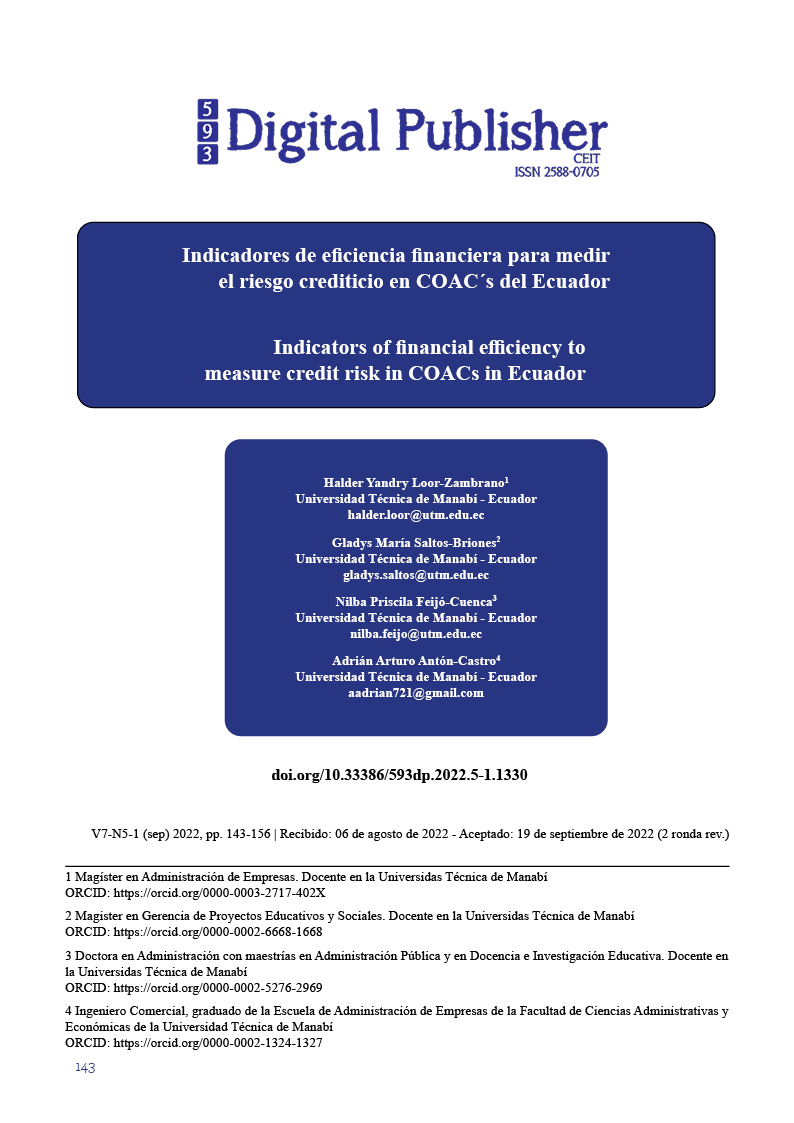Indicadores de eficiencia financiera para medir el riesgo crediticio en COAC´s del Ecuador
Contenido principal del artículo
Resumen
El objetivo de esta investigación se basa en evaluar los indicadores financieros para medir el riesgo crediticio en cooperativas de ahorro y crédito del Ecuador, se aplicó una metodología bajo un método deductivo y sintético, a través de la evaluación de dos Cooperativas de Ahorro y Crédito para su análisis respectivo. Se realizaron, encuestas a los socios de las COAC de la UTM y la Abdón Calderón, además de entrevistas al Gerente de cada COAC, así como al Superintendente de Economía Popular y Solidaria en Manabí. En este sentido se determinó que es importante que exista la segmentación de los socios y que dentro de esta segmentación existan grupos homogéneos para poder establecer productos que sean acordes a cada grupo de socios según sus capacidades y necesidades, Es importante resaltar que al no existir una adecuada segmentación provoca ineficiencia financiera en indicadores como la morosidad y la rentabilidad, así como también, que al tener una gestión de riesgo de crédito adecuada puede disminuir en gran medida los niveles de morosidad, que a su vez mejora la rentabilidad de la Cooperativa, sin embargo, esto no sucede en especial en los socios de la COAC de la UTM, al no existir una segmentación de los socios, o un especialista encargado de esta situación genera que no existan ofertas de productos acordes a las necesidades de los socios lo que hace más difícil medir el riesgo de crédito.
Descargas
Detalles del artículo

Esta obra está bajo una licencia internacional Creative Commons Atribución-NoComercial-CompartirIgual 4.0.
1. Derechos de autor
Las obras que se publican en 593 Digital Publisher CEIT están sujetas a los siguientes términos:
1.1. 593 Digital Publisher CEIT, conserva los derechos patrimoniales (copyright) de las obras publicadas, favorece y permite la reutilización de las mismas bajo la licencia Licencia Creative Commons 4.0 de Reconocimiento-NoComercial-CompartirIgual 4.0, por lo cual se pueden copiar, usar, difundir, transmitir y exponer públicamente, siempre que:
1.1.a. Se cite la autoría y fuente original de su publicación (revista, editorial, URL).
1.1.b. No se usen para fines comerciales u onerosos.
1.1.c. Se mencione la existencia y especificaciones de esta licencia de uso.
Citas
Antón-Castro, A. (2021). Indicadores de eficiencia financiera para medir el riesgo crediticio en Cooperativas de Ahorro y Crédito COAC del Ecuador. Tesis, Universidad Técnica de Manabí.
Chabusa, J., Delgado, S., & Mackay, C. (2019). Administración del riesgo operativo en las cooperativas de ahorro y crédito del Ecuador. Revista de Ciencias Sociales (RCS), XXV(4), 134-147. Obtenido de https://dialnet.unirioja.es/servlet/articulo?codigo=7202004
Coba-Molina, E., & Díaz-Cordova, J. (2022). Principios cooperativos: análisis desde la imagen y beneficios de una cooperativa de Ecuador. Revista Venezolana de Gerencia (RVG), 27(Especial 7), 680-696. doi:https://doi.org/10.52080/rvgluz.27.7.44
Díaz, D. (2015). El riesgo crediticio y la cartera vencida de la cooperativa de ahorro y crédito Coorambato LTDA. de la ciudad de Ambato, Provincia de Tungurahua. Perfil de Tesis previo a la obtención del título de Ingeniera Financiera, Universidad Técnica de Ambato, Ambato, Ecuador. Obtenido de http://repositorio.uta.edu.ec/jspui/handle/123456789/17557
García, N. (2019). Gestión de riesgos en las entidades financieras: El Riesgo de Crédito. Trabajo de Fin de Grado , Universidad de Valladolid, Valladolid. Obtenido de https://core.ac.uk/download/pdf/286337775.pdf
Gutiérrez-Antón, G., & Loor-Zambrano, H. (2022). Inversiones a plazo fijo y su incidencia en la gestión financiera en una cooperativa. Revista Científica Multidisciplinaria Arbitrada YACHASUN, 6(10). doi:https://doi.org/10.46296/yc.v6i10edespmay.0175
Hinostroza, G., de la Oliva, F., & Gómez, S. (2019). La segmentación de socios en la Cooperativa de Ahorro y Crédito de la Universidad Técnica de Manabí, en Ecuador. COFINHABANA. Obtenido de http://www.cofinhab.uh.cu/index.php/RCCF/article/viewFile/372/362
Junta de Regulación Monetaria Financiera. (2015). Resolución N° 129-2015-F. Código Orgánico Monetario y Financiero. Obtenido de https://www.bce.fin.ec/images/junta/resolucion129f.pdf?dl=0
Lara, E. (2014). Análisis del sector Cooperativo del segmento 4 en la Economía Popular y Solidaria. Tesis de grado presentada como requisito para la obtención del título de Licenciado en Finanzas, Universidad San Francisco de Quito, Quito. Obtenido de http://repositorio.usfq.edu.ec/handle/23000/3646
Laverán, M., Bley, L., & Ricatti, M. (2017). El cooperativismo. Historia, Evolución y Rol Actual. Consejo profesional de Ciencias Económicas, MISIONES, 1(4). Obtenido de https://cpcemnes.org.ar/ekodivulgando/index.php/revista/article/view/44/33
Leal, A., Aranguiz, M., & Gallegos, J. (2018). Análisis de riesgo crediticio, propuesta del Modelo Credit Scoring. Revista Facultad de Ciencias Económicas, 26(1). doi:https://doi.org/10.18359/rfce.2666
Lligalo, C. (2019). Análisis financiero y estrategias de crecimiento para la cooperativa de ahorro y crédito Ambato. Proyecto de investigación previo a la obtención del título de Contabilidad y Auditoría, Pontificia Universidad Católica del Ecuador, Ambato, Ecuador. Obtenido de https://repositorio.pucesa.edu.ec/handle/123456789/2825
López, C., & Quizphe, S. (2020). Estudio comprativo de la morosidad que presentan las cooperativas de ahorro y crédito del segmento 1 y 4 en el periodo 2015-2019: Propuesta de Gestión Financiera. Tesis, Universidad de las Fuerzas Armadas. Obtenido de http://repositorio.espe.edu.ec/handle/21000/22800
Martínez, C. (02 de Noviembre de 2021). ROA. Recuperado el 08 de Agosto de 2022, de Definición e importancia para la rentabilidad de tu empresa: https://www.dripcapital.com/es-mx/recursos/blog/que-es-roa
Muñoz, C. (2015). Metodología de la investigación. México: OXFORD.
Paredes, M. (02 de Mayo de 2021). ¿Qué es el ROE y cuál es su importancia en la administración de una empresa. Recuperado el 07 de Agosto de 2022, de https://marketdata.com.py/educacion/economia-facil/que-es-el-roe-y-cual-es-su-importancia-en-la-administracion-de-una-empresa-43420/
Ramírez-Díaz, L., Herrera-Ospina, J., & Londoño-Franco, L. (2016). El cooperativismo y la economía solidaria: génesis e historia. Cooperativismo & Desarrollo, 24(109), 133-145. doi:https://doi.org/10.16925/co.v24i109.1507
Salinas, J., & Lojano, V. (2019). Análisis de los factores que inciden en la gestión de riesgos financieros en las cooperativas de Ahorro y Crédito del Segmento Cinco, Cuenco 2018. Revista Observatorio de la Economía Latinoamericana. Obtenido de https://www.eumed.net/rev/oel/2019/02/gestion-riesgos-financieros.html
Superintendencia de Economía Popular y Solidaria, SEPS. (2022). Portal Estadístico SEPS. Recuperado el 30 de Julio de 2022, de https://www.seps.gob.ec/
Velástegui, M. (2022). Análisis del riesgo financiero de las empresas de construcción del cantón Riobamba, aplicando la gestión financiera, como mecanismo de mejoramiento de los recursos económicos. Caso Empresa TUGALT Riobamba, período 2019. Trabajo de titulación modalidad: Proyecto de Investigación y Desarrollo, presentado ante el Instituto de Posgrado y Educación Continua de la ESPOCH como requisito para obtener el grado de Magíster en Finanzas, Escuela Superior Politécnica de Chimborazo, Riobamba, Ecuador. Obtenido de http://dspace.espoch.edu.ec/bitstream/123456789/16199/1/20T01517.pdf





